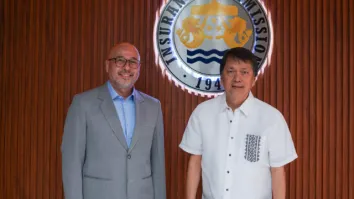
How customer centricity can aid the Philippines’ narrow insurance penetration
With less than 3% insurance penetration, insurance experts concur that low financial literacy has eroded potential.
The lack of product personalisation and a customer-centric approach has kept the Philippines’ insurance penetration at a low, dragging the potential growth the industry has, according to insurance leaders. Six insurance experts spoke about overcoming the low insurance penetration barrier at the 2023 Insurance Asia forum in Manila last 3 October.
The industry, once characterised by its traditional products and customer-centric approach, is undergoing a seismic shift whilst six key focus areas must be given close attention. Charisse Rossielin Y. Cruz, consulting partner at EY, shared with fellow insurers the upcoming trends, problem areas, and possible opportunities.
Cruz spelled out these six focus areas as: product, service, and experience innovation; distribution model agility; talent flexibility; impactful marketing and enhanced service; upgraded streamlined IT architecture operational excellence across the enterprise; and merger and acquisition (M&A) and capital management strategies.
Insurance is no longer seen as a standalone product, Cruz emphasised. It now seeks holistic solutions that encompass protection, savings, and investments, and are tailored to people’s evolving life stages.
“But, beyond retirement savings and health insurance coverage gaps, many consumers lack financial knowledge and confidence,” she said. In the Philippines, 83% of Filipinos are concerned the most about losing a loved one earlier than expected. This was followed by their financial well-being (80%), hospitalisation expenses (79%), and loss of stable income (78%).
Forces shaping the industry
Manulife Philippines President and Chief Executive Officer (CEO) President Rahul Hora, pointed out that despite the severe changes of the pandemic era, the “industry is resilient because we can adapt to change.”
For Manulife Philippines, there are three ways experts can pivot from the effects of COVID-19: health, digital enablement, and diversification of savings.
Acknowledging the impact of the COVID-19 pandemic, Hora posed a thought-provoking question to his audience: “How many of you in this room believe that COVID-19 is over?”
Whilst some attendees expressed optimism by raising their hands, Hora emphasised that, despite medical advancements, the pandemic’s impact continues to ripple through various aspects of our lives.
He highlighted how the pandemic has reshaped public health, communication, travel, education, and work. It’s essential to understand that the post-pandemic world is not a mere return to the pre-pandemic norm; rather, it represents a new era with distinct challenges and opportunities.
Covering age
The insurance industry has adapted swiftly to pandemic challenges by leveraging digital capabilities. However, Al Quitangon, chief distribution officer at Sun Life Philippines, stressed that “going digital” transcends mere technological adoption; it’s an opportunity to touch more Filipino lives through life insurance.
For Sun Life Philippines, its core mission is aided, not supplanted, by tech adoption so it maintains a purpose-driven force. The company believes that while technology can enhance efficiency and reach, it’s the unwavering dedication to serving Filipinos that remains at the heart of the business.
To live up to this commitment, Sun Life Philippines promotes several strategies.
First, they focus on sharing the stories of their advisors’ impact. Amidst the daily hustle and bustle, it’s easy for advisors to get lost in their tasks. By showcasing the meaningful impact they have on clients’ lives, Sun Life said it inspires its agency force to stay dedicated.
Continuous learning is another cornerstone of their strategy. Advisors must remain empowered to empower clients, the insurer said. Sun Life offers ongoing educational opportunities to ensure its advisors stay ahead in an evolving industry and counter rising threats like financial scams.
Moreover, Sun Life encourages its agency force to give back to the community through corporate social responsibility initiatives. Not only is this fulfilling for advisors, but it also strengthens their connection to company values and advocacies.
Upscaling coverage
During a panel discussion moderated by Alvin Dave Pusing, director of financial services and risk consulting at PwC, three perspectives cropped up to identify how insurers can boost insurance penetration – not only in the country but in the region.
The panellists acknowledged that the insurance industry traditionally relied on personal relationships and agent-driven models. The emergence of digital insurance, initially met with scepticism, gained momentum as a response to the pandemic, forcing the industry to innovate.
Prahlad Agarwal, head of strategy and chief of staff to the CEO of Manulife Philippines, emphasised the need to redefine customer demographics in a post-COVID world. His key recommendations to move from product to proposition-based selling include identifying the current needs, imagining the distribution channels, and forming a solid customer experience.
“How can we build our model because essentially, it’s a subscription-based model where we expect the customers to pay the premiums so that they can get their coverage forever. And I think the new age customer would kind of relate that with other subscription services, like maybe Netflix, streaming channels. So how, as a sector, we can maybe not match, but kind of come to a situation where we can deliver those in a more acceptable way,” Agarwal said.
Gino Carlo Riola, chief marketing officer of Allianz PNB Life Philippines, talked about the challenges of low insurance penetration in the Philippines, which has remained around 2%-3%. He stressed the importance of financial literacy and changing the cultural perception of spending money, emphasising the need for long-term financial planning.
“We definitely need to do a lot in terms of education. Going back through the whole point, I think COVID gave us this opportunity to really make the point that this is not something to be scared of. As a matter of fact, a lot of Filipinos really need it, so the point around health insurance is important. The realisation that if you are living in the Philippines, you have a healthcare problem,” Riola said.
Michelle Cordero-Garcia, chief HR officer of Sun Life Philippines, indicated the vital role insurers play in the assurance of a good relationship with clients.
“We encourage our employees to be active in attending our agency events, because we feel that if they understand the entire ecosystem of every person in the organisation, advisors or stakeholders, and clients, then they will have a deeper appreciation of what it is that we’re doing for our clients.” she said.



















 Advertise
Advertise






